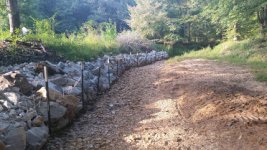Just ducking in here real quick to say that I agree on the importance of communication with neighbors. I'm sharing my situation here so as to be educated on the topic before approaching them. So please keep them replies coming. While this doesn't seem too big of a deal to some, whenever we get heavy rain or fast snowmelt (we get over 10 feet of snow annually) and the creek overflows its banks, the water comes within 50' of my septic drain field and less than 200' from my home. Not to mention the culvert pipes under the footbridge (used by our horses and goats to access a far pasture) that fill to 80% or more of capacity. I'm not willing to gamble that the volume of Fred's redirected water won't be significant enough to cause problems sometime down the road.
For the record, Fred's standing water does just that: it stands along the surface of the ground. It does not traverse 400 feet across Bob's property and end up in the creek. That water, "saturated at or near the surface for extended periods during the growing season" (per US Fish & Wildlife, see below) eventually evaporates or percolates into the ground. While Fred's land is certainly upland from mine, the elevation difference is just a few feet and most of Bob's land (located between Fred's wetland and the creek) is thick brush and windfallen trees and does not permit water to flow readily.
Kcfl your call to your neighbor alerting him to the fact that water was flowing to your side of the pond was cute. He could've countered by pointing out that quite often your fish went on his side, so both sides are harmed equally.

After reading responses to my original post and digging deeper into the interwebs, I've learned a few things. Most important: the wet portion of Fred's land and the portion of Bob's land that presumably will be excavated appear to be wetlands (category: Freshwater Emergent Wetland) as shown on the US Fish & Wildlife National Wetland Inventory as well as NYS protected freshwater wetlands. So is a portion of my land that most certainly will be impacted by the drainage (News to me!!). Fred's hopes may be dashed simply because "artificial means" will be used to direct the diffuse surface water and I think it can be reasonably argued that the additional flow of water into the creek on my property will be of such volume as to "exceed the natural capacity of the creek." After all, the creek overflows it's banks already during heavy rainfall.
"owner may not cause water to discharge into a natural stream in such quantity as to exceed its natural capacity.... However, as long as the natural capacity of the stream is not exceeded, a riparian owner may increase the quantity of water placed into such stream." Stanklus v. County of Montgomery
A landowner may thus grade his parcel regardless of impact on surface water flows provided (1) the improvements are made in good faith to meet the most naturally suitable use of the land and (2) water is not directed onto other properties via artificial means such as "pipes, drains, channels, or ditches." Hoffman v. Appleman
I will check back soon and I will be sure to describe how this issue resolves. Thanks to all who have taken time to chime in.

